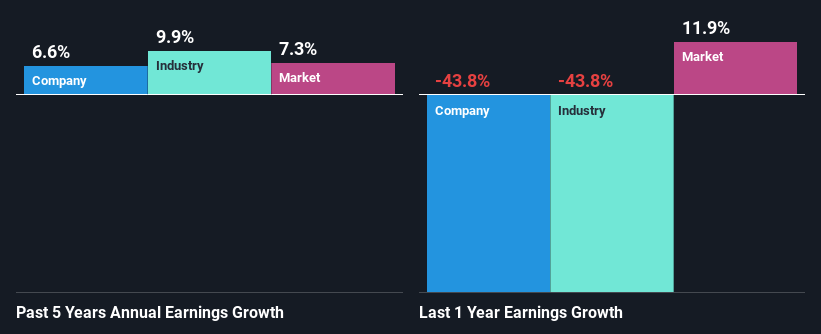Meridian Energy Limited's (NZSE:MEL) Dismal Stock Performance Reflects Weak Fundamentals
With its stock down 8.1% over the past three months, it is easy to disregard Meridian Energy (NZSE:MEL). Given that stock prices are usually driven by a company’s fundamentals over the long term, which in this case look pretty weak, we decided to study the company's key financial indicators. In this article, we decided to focus on Meridian Energy's ROE.
Return on equity or ROE is a key measure used to assess how efficiently a company's management is utilizing the company's capital. In other words, it is a profitability ratio which measures the rate of return on the capital provided by the company's shareholders.
See our latest analysis for Meridian Energy
How Is ROE Calculated?
Return on equity can be calculated by using the formula:
Return on Equity = Net Profit (from continuing operations) ÷ Shareholders' Equity
So, based on the above formula, the ROE for Meridian Energy is:
4.2% = NZ$212m ÷ NZ$5.0b (Based on the trailing twelve months to December 2020).
The 'return' is the amount earned after tax over the last twelve months. So, this means that for every NZ$1 of its shareholder's investments, the company generates a profit of NZ$0.04.
What Is The Relationship Between ROE And Earnings Growth?
Thus far, we have learned that ROE measures how efficiently a company is generating its profits. We now need to evaluate how much profit the company reinvests or "retains" for future growth which then gives us an idea about the growth potential of the company. Assuming everything else remains unchanged, the higher the ROE and profit retention, the higher the growth rate of a company compared to companies that don't necessarily bear these characteristics.
Meridian Energy's Earnings Growth And 4.2% ROE
When you first look at it, Meridian Energy's ROE doesn't look that attractive. However, its ROE is similar to the industry average of 4.2%, so we won't completely dismiss the company. On the other hand, Meridian Energy reported a moderate 6.6% net income growth over the past five years. Taking into consideration that the ROE is not particularly high, we reckon that there could also be other factors at play which could be influencing the company's growth. For example, it is possible that the company's management has made some good strategic decisions, or that the company has a low payout ratio.
We then compared Meridian Energy's net income growth with the industry and found that the company's growth figure is lower than the average industry growth rate of 9.9% in the same period, which is a bit concerning.
Earnings growth is an important metric to consider when valuing a stock. What investors need to determine next is if the expected earnings growth, or the lack of it, is already built into the share price. Doing so will help them establish if the stock's future looks promising or ominous. Has the market priced in the future outlook for MEL? You can find out in our latest intrinsic value infographic research report.
Is Meridian Energy Using Its Retained Earnings Effectively?
Meridian Energy's high three-year median payout ratio of 167% suggests that the company is paying out more to its shareholders than what it is making. In spite of this, the company was able to grow its earnings respectably, as we saw above. Although, the high payout ratio is certainly something we would keep an eye on if the company is not able to keep up its growth, or if business deteriorates. To know the 3 risks we have identified for Meridian Energy visit our risks dashboard for free.
Additionally, Meridian Energy has paid dividends over a period of six years which means that the company is pretty serious about sharing its profits with shareholders. Upon studying the latest analysts' consensus data, we found that the company is expected to keep paying out approximately 183% of its profits over the next three years. Still, forecasts suggest that Meridian Energy's future ROE will rise to 5.4% even though the the company's payout ratio is not expected to change by much.
Conclusion
On the whole, Meridian Energy's performance is quite a big let-down. While the company has posted decent earnings growth, the company is retaining little to no profits and is reinvesting those profits at a low rate of return. This makes us doubtful if that growth could continue, especially if by any chance the business is faced with any sort of risk. Having said that, the company's earnings growth is expected to slow down, as forecasted in the current analyst estimates. To know more about the company's future earnings growth forecasts take a look at this free report on analyst forecasts for the company to find out more.
This article by Simply Wall St is general in nature. It does not constitute a recommendation to buy or sell any stock, and does not take account of your objectives, or your financial situation. We aim to bring you long-term focused analysis driven by fundamental data. Note that our analysis may not factor in the latest price-sensitive company announcements or qualitative material. Simply Wall St has no position in any stocks mentioned.
Have feedback on this article? Concerned about the content? Get in touch with us directly. Alternatively, email editorial-team (at) simplywallst.com.

 Yahoo Finance
Yahoo Finance 
